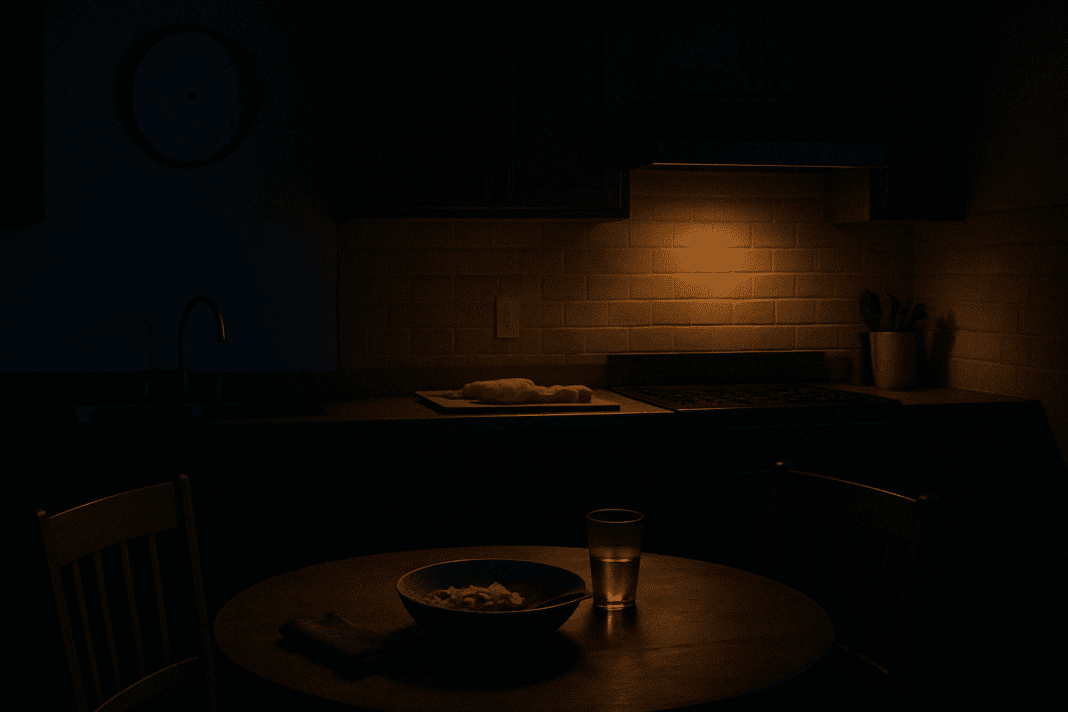In a society where round-the-clock activity is the norm, mealtimes have become increasingly flexible. Late dinners, midnight snacks, and post-dinner indulgences are often justified by busy work schedules or social events. But as science continues to unravel the complex relationship between eating patterns and health, one question grows more relevant: what time should you stop eating at night? Understanding the physiological and metabolic consequences of late-night eating is crucial, not only for those managing weight but for anyone seeking to improve sleep quality, energy levels, and long-term wellness. This article dives deep into the science behind nighttime eating, exploring how it affects your body’s internal rhythms, hormonal balance, and overall health.
You may also like: How to Stop Emotional Eating and Regain Control: Mindful Nutrition Strategies That Support a Healthier Lifestyle
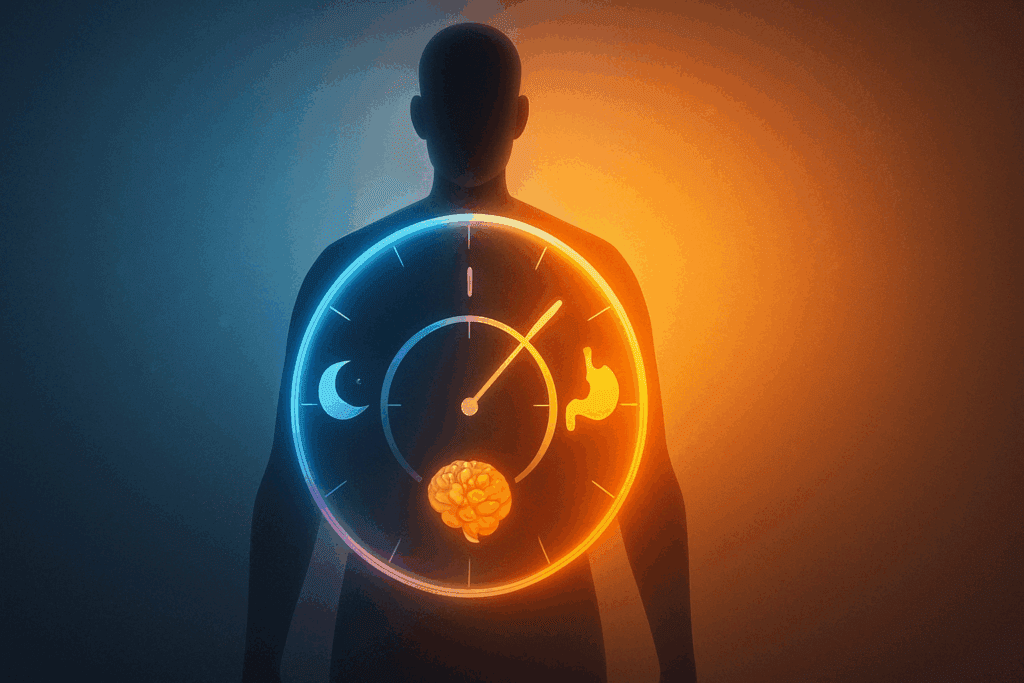
The Circadian Rhythm: Your Body’s Internal Clock
Our bodies operate according to a 24-hour internal clock known as the circadian rhythm. This biological cycle regulates various physiological functions, including sleep-wake cycles, hormone production, and even metabolism. Eating in sync with this rhythm supports optimal digestion, nutrient absorption, and energy usage. When we eat at irregular hours, particularly late at night, we disrupt this delicate balance. The body’s readiness to digest and metabolize food declines as the day progresses, making nighttime eating a potential disruptor of metabolic efficiency.
Several studies suggest that insulin sensitivity—the body’s ability to process glucose efficiently—is higher during the day and significantly drops in the evening. Eating late, especially carbohydrate-heavy meals, can result in higher postprandial glucose levels, increasing the risk of insulin resistance over time. This creates a strong argument for aligning meal timing with the body’s natural rhythm, reinforcing the relevance of asking not only “is eating at night bad for you” but also how our internal clocks influence the answer.
The Metabolic Consequences of Eating Late
The timing of meals can significantly influence metabolism. When food is consumed late at night, the body is less efficient at breaking down nutrients and storing energy. This metabolic inefficiency often leads to elevated blood sugar levels and increased fat storage. Studies have shown that people who regularly engage in late-night eating are more likely to experience weight gain, increased body fat percentage, and a higher risk of developing metabolic syndrome.
The thermic effect of food—the energy required to digest, absorb, and metabolize nutrients—is also reduced during the evening hours. This means that the same meal will burn fewer calories when consumed at 10 p.m. compared to 6 p.m. Furthermore, eating late can affect leptin and ghrelin levels, the hormones responsible for satiety and hunger. Disruption in these hormones can lead to increased appetite the following day, creating a vicious cycle of overeating and poor dietary choices. Thus, when evaluating what time should you stop eating at night, the metabolic data strongly suggests an earlier cutoff.
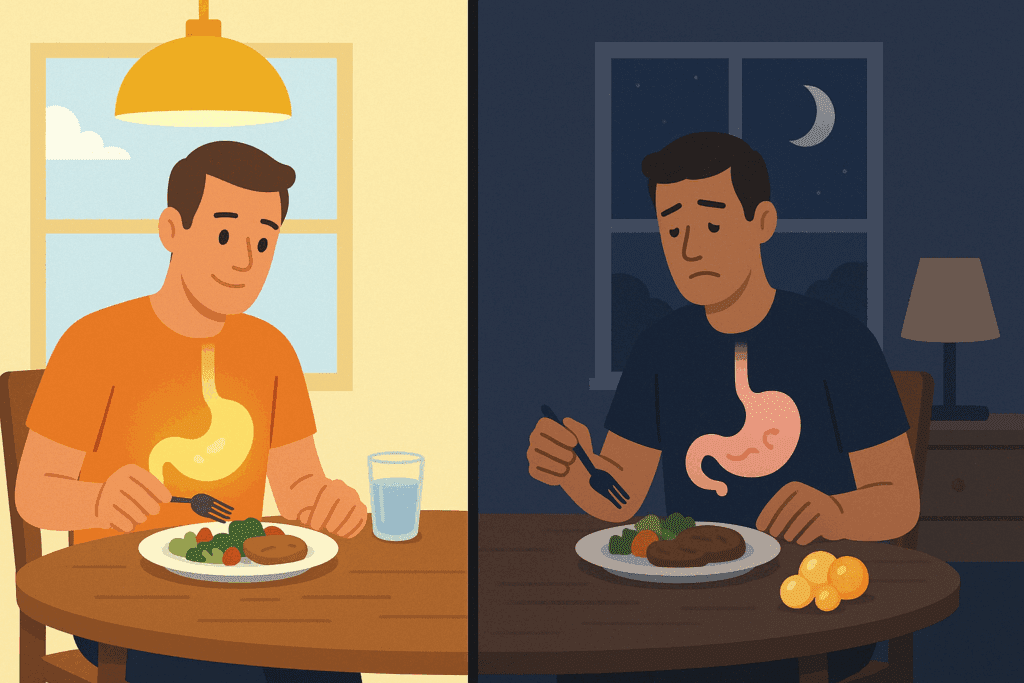
Sleep Disruption and Gastrointestinal Distress
Sleep is a cornerstone of health, and its quality is intimately connected with our eating habits. Consuming food too close to bedtime can negatively affect sleep quality. Digestive activity increases after a meal, requiring energy and raising core body temperature—both of which can interfere with the natural cooling process needed for falling and staying asleep. People who eat late frequently report difficulty falling asleep, fragmented sleep, and reduced REM cycles.
Moreover, eating late increases the risk of gastrointestinal discomfort, such as acid reflux and indigestion. When the body is horizontal during sleep, gravity no longer aids digestion, and stomach acid can more easily travel back up the esophagus. This is particularly problematic for those who suffer from gastroesophageal reflux disease (GERD). To minimize these disruptions, it’s worth asking not just how long should you stop eating before bed, but what types of foods may exacerbate nighttime discomfort.
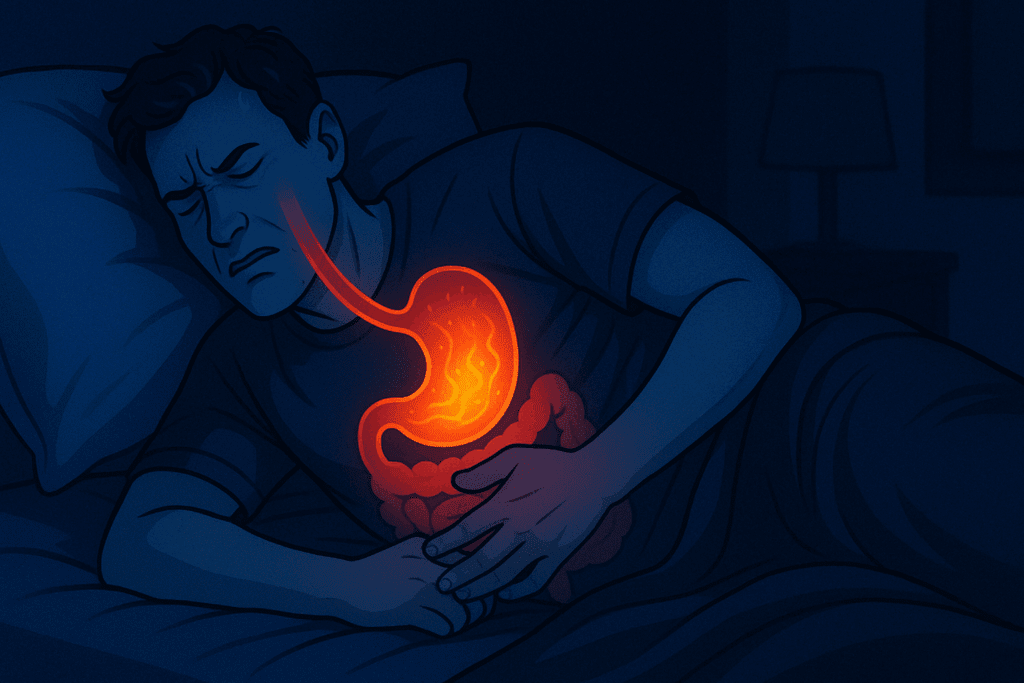
Hormonal Interplay: Melatonin, Insulin, and Cortisol
Eating late can influence the balance of several critical hormones. Melatonin, the hormone responsible for initiating sleep, begins to rise as darkness falls. Interestingly, melatonin suppresses insulin production, making it more difficult for the body to manage blood sugar levels after a late meal. This interplay suggests that eating in the hours leading up to bedtime can result in higher overnight glucose levels, potentially contributing to long-term metabolic dysfunction.
Cortisol, the body’s primary stress hormone, also plays a role. Elevated evening cortisol levels—either from stress or late eating—can disrupt sleep patterns and promote fat accumulation, especially around the abdomen. The overlap of cortisol and insulin dysfunction creates an environment conducive to weight gain and hormonal imbalance. The question “is eating at night bad for you” becomes especially relevant in the context of these hormonal shifts that can negatively affect both short-term wellbeing and long-term health.
How Long Should You Stop Eating Before Bed?
While individual responses can vary, many experts recommend stopping food intake at least two to three hours before bedtime. This window allows the body to complete the initial stages of digestion before transitioning into rest and repair mode during sleep. For example, if your usual bedtime is 10:00 p.m., you should aim to finish dinner by 7:00 p.m.
The quality and composition of the last meal also matter. A high-protein, fiber-rich dinner with complex carbohydrates and healthy fats can support satiety and stable blood sugar levels throughout the night. Avoiding high-sugar, high-fat, or heavily processed foods in the evening reduces the likelihood of sleep disturbances and late-night cravings. Understanding how long should you stop eating before bed is not just about clock time; it’s about recognizing how your meal choices interact with your body’s overnight functions.
Late Night Eating and Weight Gain: A Closer Look
The link between eating late and weight gain is increasingly well-documented. Nighttime eating, particularly when it becomes habitual, is often associated with excessive calorie intake. This is partly due to emotional eating triggers like stress or boredom, which are more common in the evening. Additionally, those who eat late may skip breakfast or eat irregular meals during the day, disrupting the body’s hunger and fullness cues.
Late night eating often includes calorie-dense, nutrient-poor foods, such as chips, sweets, and fast food. These choices are not only high in calories but also tend to spike blood sugar and promote fat storage. Over time, this pattern contributes to a higher body mass index (BMI) and increased risk of chronic illnesses like type 2 diabetes and cardiovascular disease. Therefore, when considering what time should you stop eating, it’s essential to factor in not just timing but behavioral tendencies that influence evening food choices.
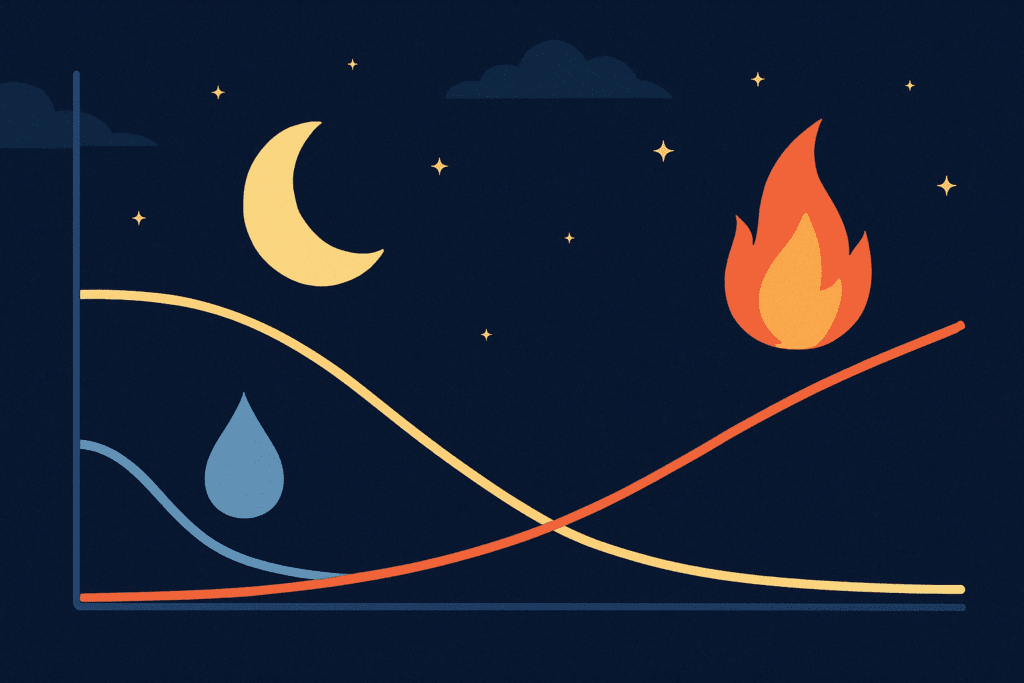
Cognitive and Emotional Impacts of Eating Late
Beyond the physical effects, eating late can also influence mental health. Poor sleep due to nighttime eating can impair cognitive function, reduce focus, and increase irritability. Sleep deprivation has been linked to poorer decision-making, particularly around food. When well-rested, people are more likely to make healthier food choices; when tired, cravings for sugar and high-fat foods intensify.
Furthermore, there is growing evidence linking late eating patterns to increased symptoms of anxiety and depression. While causation remains a topic of research, the association is thought to stem from both physiological and psychological mechanisms. Disruptions in sleep and hormone balance, paired with feelings of guilt or loss of control around eating, can negatively affect emotional wellbeing. In this context, understanding what time should you stop eating at night also becomes a matter of emotional self-care and mental balance.
Does the Type of Food Matter?
While timing is important, the composition of late meals plays a critical role in how the body responds. A small, nutrient-rich snack—such as a handful of almonds or a serving of Greek yogurt—may be less disruptive than a plate of pasta or a slice of cake. Foods high in tryptophan, magnesium, or melatonin (such as turkey, bananas, and tart cherries) can even support relaxation and sleep quality.
On the other hand, spicy, acidic, or caffeinated foods can cause digestive distress or stimulate the nervous system, making it harder to fall asleep. High-sugar foods create blood sugar spikes followed by crashes, which may wake you up during the night. In sum, when evaluating is eating at night bad for you, it’s essential to consider not only when but what you’re eating.
Intermittent Fasting and Time-Restricted Eating
Intermittent fasting and time-restricted eating have gained popularity as strategies to align eating habits with circadian biology. These approaches typically involve limiting food intake to an 8- to 12-hour window each day and fasting for the remaining hours. Research suggests that early time-restricted eating—where most calories are consumed earlier in the day—can improve insulin sensitivity, promote weight loss, and support metabolic health.
Time-restricted eating naturally discourages late-night eating and encourages a regular eating rhythm. By closing the kitchen earlier, individuals often find it easier to avoid mindless snacking and regulate calorie intake. These benefits have contributed to a renewed interest in the question of what time should you stop eating at night, particularly among those looking to improve metabolic markers or lose weight sustainably.
Cultural and Lifestyle Considerations
It’s important to acknowledge that meal timing is influenced by cultural norms, work schedules, and family dynamics. In many countries, dinner is traditionally served later in the evening, and social gatherings often revolve around food. Shift workers and night owls may also have unique circadian rhythms that deviate from the conventional 9-to-5 structure.
For these individuals, the question of how long should you stop eating before bed may need to be reframed to accommodate personal routines. The goal remains the same: to allow adequate time between the last meal and sleep, to prioritize nutrient-dense foods, and to maintain a consistent eating schedule. Personalized nutrition strategies are essential for making sustainable lifestyle changes that support both health and cultural identity.
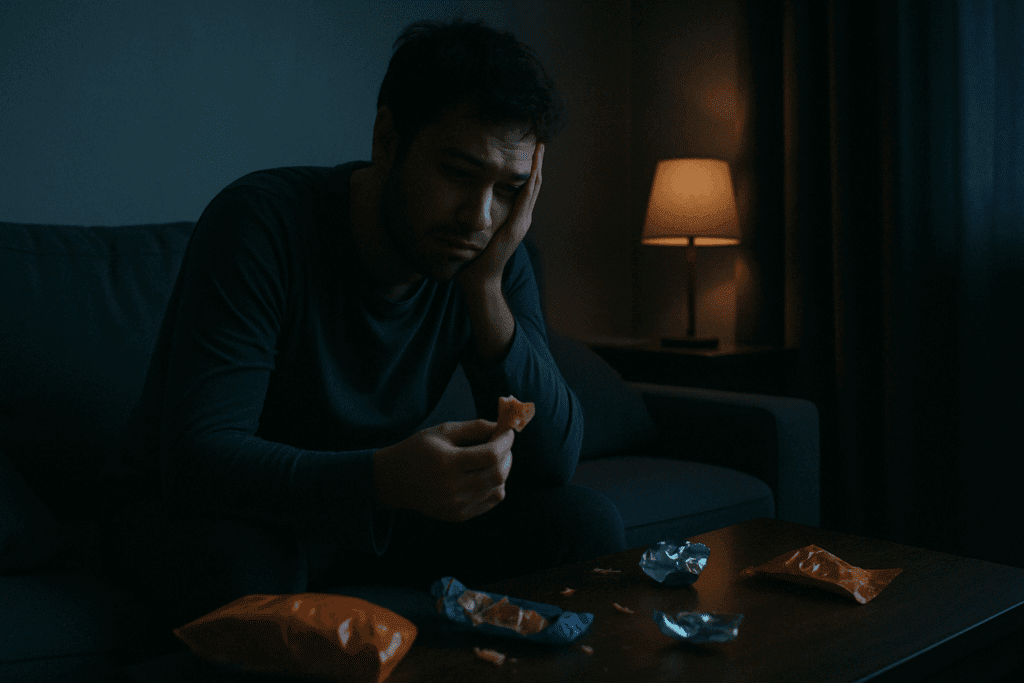
Practical Tips for Healthier Nighttime Eating Habits
Shifting away from late-night eating requires both awareness and planning. Start by setting a consistent dinner time and gradually moving it earlier if needed. Keep healthy snacks readily available to prevent impulsive, unhealthy choices in the evening. Drinking herbal teas or sparkling water can serve as a soothing ritual to replace late-night snacking.
If you find yourself truly hungry late at night, opt for a light, nutrient-rich option and avoid large or complex meals. Journaling your hunger cues and energy levels throughout the day can help identify whether you are eating out of habit, emotion, or genuine need. As you develop more mindful eating patterns, you may find that the question of what time should you stop eating becomes easier to answer intuitively, based on your body’s signals and needs.
How to Reframe Your Relationship With Evening Eating
Rather than approaching nighttime eating with guilt or restriction, consider it an opportunity for reflection and self-awareness. Ask yourself what purpose the food serves—is it comfort, distraction, routine, or genuine hunger? Developing a more compassionate and curious relationship with food can reduce late-night eating episodes and improve overall health.
Incorporating mindfulness practices, such as deep breathing or meditation, can help you pause before reaching for food late at night. Creating a wind-down routine that doesn’t center around eating can also signal to your body that it’s time to rest. By focusing on nourishment rather than restriction, the process of shifting your evening habits becomes more sustainable and emotionally satisfying.
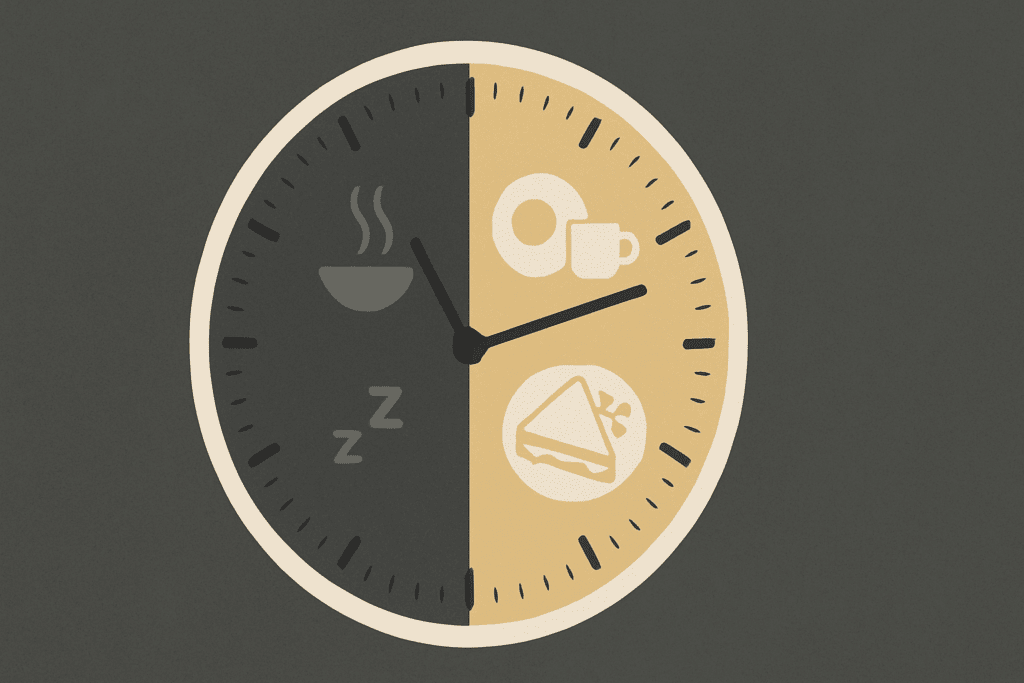
A Balanced Perspective on Nighttime Eating
Ultimately, the answer to “is eating at night bad for you” depends on multiple factors: timing, portion size, food quality, and individual physiology. Occasional late meals are not inherently harmful, especially when balanced with nutrient-rich choices and adequate sleep. However, making late-night eating a routine habit may lead to a cascade of negative metabolic, hormonal, and emotional effects.
Instead of rigid rules, aim for informed flexibility. Prioritize consistency in meal timing, listen to your body’s hunger cues, and understand how your eating patterns influence your energy, mood, and sleep. In doing so, the question of what time should you stop eating becomes part of a broader conversation about how to support your body’s rhythms and respect its need for rest and renewal.
Frequently Asked Questions: Nighttime Eating and Health
1. Can eating late occasionally still impact long-term health?
Yes, even occasional late night eating can influence long-term health, though the extent depends on frequency and individual metabolic responses. While a single late meal won’t derail your wellness, consistent disruptions to your circadian rhythm and digestion may slowly contribute to insulin resistance and sleep issues. Emerging evidence suggests that the body’s overnight metabolic processes are highly sensitive, meaning that even small irregularities in timing can create cumulative effects. Therefore, asking “is eating at night bad for you” isn’t about isolated instances, but about patterns that form over time. For optimal health, even infrequent eating late at night should be balanced with nutrient-dense foods and adequate sleep recovery.
2. What role does chronotype play in nighttime eating habits?
Chronotype—whether you’re naturally a morning or evening person—plays a major role in how your body handles food timing. For evening chronotypes, it might feel more natural to eat later, but that doesn’t necessarily mean their bodies metabolize food more efficiently at night. Research has shown that eating late still negatively affects insulin sensitivity and glucose control, even in night owls. So when considering what time should you stop eating at night, it’s essential to tailor recommendations to personal rhythms without ignoring biological limitations. Regardless of chronotype, allowing the body time to rest and fast overnight appears beneficial across the board.
3. How does alcohol influence the effects of eating late?
Alcohol amplifies the metabolic downsides of eating late. When consumed with food close to bedtime, it interferes with digestion, impairs REM sleep, and contributes to nighttime awakenings. Additionally, alcohol can relax the lower esophageal sphincter, increasing the risk of acid reflux when paired with late meals. If you’re evaluating how long should you stop eating before bed, it’s wise to consider alcohol alongside food, as the combination often prolongs digestive stress and intensifies the metabolic toll of eating late. Reducing alcohol intake at night can significantly improve how the body processes late meals.
4. Are there differences in how men and women respond to eating late?
Gender can influence the body’s response to late night eating due to hormonal variations. Women, for instance, experience monthly hormonal fluctuations that affect insulin sensitivity, making them potentially more vulnerable to the metabolic consequences of eating late. Men may experience less variability but still show disrupted glucose regulation and sleep architecture after nighttime eating. Studies suggest that meal timing may need to be more tightly regulated in women, especially during the luteal phase of the menstrual cycle. Therefore, asking “is eating at night bad for you” requires an understanding of how sex-specific physiology can shape outcomes.
5. What are the psychological drivers behind late night snacking?
Late night eating often has less to do with hunger and more to do with emotion, boredom, or stress. Cortisol, the stress hormone, tends to peak in the evening for some individuals, triggering cravings for comfort foods high in sugar or fat. These snacks can become a coping mechanism, forming habits that are difficult to break. Addressing the question of what time should you stop eating requires more than a clock-based solution—it involves uncovering the emotional cues that lead to eating at night. Mindfulness, stress management, and structured evening routines can reduce emotional eating triggers.
6. Is a small, healthy bedtime snack ever advisable?
Yes, for certain individuals—such as those managing blood sugar levels, athletes, or people with high caloric needs—a small, balanced snack before bed can be beneficial. A snack rich in protein and complex carbohydrates may stabilize blood sugar and reduce overnight awakenings caused by hunger. However, it’s essential that this doesn’t become an excuse for mindless eating late in the evening. Asking how long should you stop eating before bed becomes a nuanced issue when medical needs are involved, and consultation with a healthcare provider is advisable. The key is intentionality, not routine indulgence.
7. Can meal timing improve intermittent fasting results?
Absolutely. Intermittent fasting is more effective when aligned with the body’s circadian rhythms. Early time-restricted feeding—where the eating window ends by late afternoon or early evening—enhances metabolic markers more than late-eating patterns. So when deciding what time should you stop eating at night, those practicing intermittent fasting should aim to complete meals earlier in the day. Fasting overnight, when the body is already at rest, enhances insulin sensitivity and fat oxidation. Strategic meal timing amplifies the benefits of fasting and minimizes the drawbacks of eating late.
8. How does late night eating affect athletic performance?
Late meals can impair physical recovery by interfering with sleep quality and post-exercise hormone regulation. Athletes rely on deep, uninterrupted sleep to rebuild muscle and restore glycogen levels, both of which can be compromised by eating too close to bedtime. While replenishing after an evening workout is important, the timing and content of that meal matter greatly. To support both performance and rest, understanding what time should you stop eating is crucial for optimizing recovery. Choosing easy-to-digest foods and finishing at least two hours before sleep is ideal for most active individuals.
9. Are there cultural exceptions to the late eating risks?
In some cultures, late dinners are the norm, yet populations may still maintain good health due to other lifestyle factors like smaller portion sizes, longer meal durations, or more physical activity. Mediterranean countries, for instance, often eat later but incorporate leisurely dining and healthier ingredients. This doesn’t entirely negate the risks of eating late, but it shows that context matters. When evaluating is eating at night bad for you, cultural practices must be considered within a broader lifestyle framework. Healthy habits outside of meal timing can help buffer potential negative effects.
10. What strategies can help people shift their eating schedule earlier?
Gradually adjusting mealtimes by 15 to 30 minutes earlier each day can help reset habits without causing disruption. Preparing meals in advance, planning a consistent dinner routine, and limiting distractions in the evening all support this transition. Reducing caffeine intake and adding a wind-down activity after dinner can also help signal to the body that food time is over. The question of what time should you stop eating becomes easier to answer when supported by behavioral strategies that foster consistency. Over time, your natural appetite will begin to realign with your body’s optimal rhythms.
Conclusion: Why It Matters What Time You Stop Eating at Night
Understanding what time should you stop eating at night is not about adopting a rigid food curfew but about aligning your eating habits with your body’s natural rhythms. Late-night eating disrupts metabolism, sleep, and hormonal balance, contributing to weight gain and other chronic health issues when practiced regularly. However, by becoming aware of how long should you stop eating before bed and making small adjustments—such as finishing meals earlier, choosing the right foods, and respecting your body’s internal clock—you can significantly improve both physical and mental wellbeing.
Whether you’re aiming to sleep better, manage your weight, or simply feel more energized during the day, the timing of your meals is a powerful yet often overlooked tool. Reframing your relationship with food, especially in the evening hours, offers a sustainable path toward health that honors both scientific insight and personal intuition. By understanding the real effects of eating late, we empower ourselves to make choices that support restful sleep, metabolic balance, and long-term vitality.
Was this article helpful? Don’t let it stop with you. Share it right now with someone who needs to see it—whether it’s a friend, a colleague, or your whole network. And if staying ahead on this topic matters to you, subscribe to this publication for the most up-to-date information. You’ll get the latest insights delivered straight to you—no searching, no missing out.
Further Reading:
The Health Impact of Nighttime Eating: Old and New Perspectives

